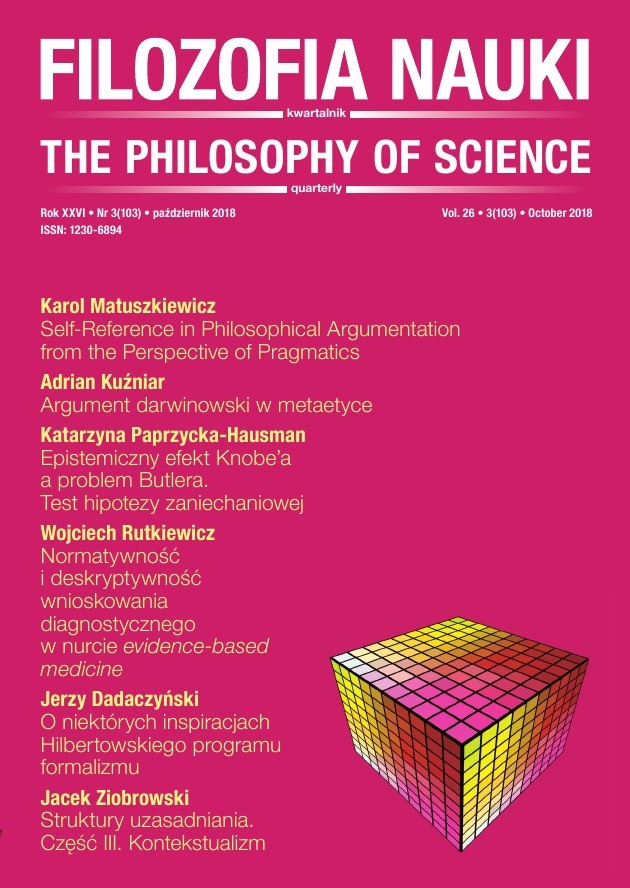Epistemic Side-Effect Effect and Butler’s Problem: A Test for the Omissions Account
DOI:
https://doi.org/10.14394/filnau.2018.0017Keywords:
pistemic side-effect effect, intentional action, intentional omission, Knobe effect, Butler problem, knowledgeAbstract
The omissions account offers structurally close explanations of the Knobe effect, the Butler problem, and the epistemic side-effect effect. Moreover, it predicts that the epistemic side-effect effect should be present not only in Knobe-type stories but also in Butler-type stories. Since the probability that the effect takes place is not greater than 1/6, the attribution of knowledge that it will take place is prima facie irrational. However, according to the omissions account, in the immoral situations, the knowledge claim can be read as a consequence-knowledge claim, which can be rationally accepted. I report the results of two studies, based on Nadelhoffer’s study of the Butler problem, where ascriptions of knowledge in Butler-type scenarios are investigated.
References
https://doi.org/10.1111/j.1468-0017.1986.tb00327.x
Alfano M., Beebe J. R., Robinson B. (2012), The Centrality of Belief and Reflection in Knobe-Effect Cases. A Unified Account of the Data, "The Monist" 95(2), 264-289.
https://doi.org/10.5840/monist201295215
Barcz M., Zaręba M. (w druku), O różnych interpretacjach efektu Knobe'a.
Beebe J. R. (2013), A Knobe Effect for Belief Ascriptions, "Review of Philosophy and Psychology" 4(2), 235-258. https://doi.org/10.1007/s13164-013-0132-9
Beebe J. R. (2016), Do Bad People Know More? Interactions between Attributions of Knowledge and Blame, "Synthese" 193(8), 2633-2657. https://doi.org/10.1007/s11229-015-0872-4
Beebe J. R., Buckwalter W. (2010), The Epistemic Side-Effect Effect, "Mind and Language" 25(4), 474-498. https://doi.org/10.1111/j.1468-0017.2010.01398.x
Beebe J. R., Jensen M. (2012), Surprising Connections between Knowledge and Action. The Robustness of the Epistemic Side-Effect Effect, "Philosophical Psychology" 25(5), 689-715. https://doi.org/10.1080/09515089.2011.622439
Buckwalter W. (2014), Gettier Made ESEE, "Philosophical Psychology" 27(3), 368-383. https://doi.org/10.1080/09515089.2012.730965
Butler R. J. (1978), Report on Analysis "Problem" No. 16, "Analysis" 38(3), 113-114. https://doi.org/10.1093/analys/38.3.113a
Cartwright N. (1983), How the Laws of Physics Lie, Oxford: Clarendon Press. https://doi.org/10.1093/0198247044.001.0001
Dalbauer N., Hergovich A. (2013), Is What Is Worse More Likely? The Probabilistic Explanation of the Epistemic Side-Effect Effect, "Review of Philosophy and Psychology" 4(4), 639-657. https://doi.org/10.1007/s13164-013-0156-1
Davidson D. (1980), Essays on Actions and Events, Oxford: Oxford University Press.
Davies K. (1981), Killing People Intentionally, by Chance, "Analysis" 41(3), 156-159. https://doi.org/10.1093/analys/41.3.156
Feinberg J. (1984), Harm to Others. The Moral Limits of the Criminal Law, Oxford: Oxford University Press.
Goldman A. I. (1970), A Theory of Human Action, Princeton, NJ: Princeton University Press.
Gorr M. (1979), Omissions [w:] Tulane Studies in Philosophy. Studies in Action Theory, t. 28, R. C. Whittemore (ed.), New Orleans: Tulane University Press, 93-102.
Holton R. (2010), Norms and the Knobe Effect, "Analysis" 70(3), 417-424.
https://doi.org/10.1093/analys/anq037
Huebner B. (2015), What Is a Philosophical Effect? Models of Data in Experimental Philosophy, "Philosophical Studies" 172(12), 3273-3292. https://doi.org/10.1007/s11098-015-0469-2
Knobe J. (2003a), Intentional Action and Side Effects in Ordinary Language, "Analysis" 63(3), 190-194.
https://doi.org/10.1093/analys/63.3.190
Knobe J. (2003b), Intentional Action in Folk Psychology. An Experimental Investigation, "Philosophical Psychology" 16(2), 309-324. https://doi.org/10.1080/09515080307771
Knobe J. (2007), Reason Explanation in Folk Psychology, "Midwest Studies in Philosophy" 31, 90-106.
https://doi.org/10.1111/j.1475-4975.2007.00146.x
Kraemer E. R. (1978), Intentional Action, Chance and Control, "Analysis" 38(3), 116-117. https://doi.org/10.2307/3327845 https://doi.org/10.1093/analys/38.3.116
Lowe E. (1980), Peacocke and Kraemer on Butler's Problem, "Analysis" 40(3), 113-118. https://doi.org/10.1093/analys/40.3.113
McCann H. (1986), Rationality and the Range of Intention, "Midwest Studies in Philosophy" 10(1), 191-211. https://doi.org/10.1111/j.1475-4975.1987.tb00540.x
McCann H. (1991), Settled Objectives and Rational Constraints, "American Philosophical Quarterly" 28(1), 25-36.
Mele A. (1992), Springs of Action. Understanding Intentional Behavior, New York: Oxford University Press.
Mele A. R., Moser P. K. (1994), Intentional Action, "Nous" 28(1), 39-68. https://doi.org/10.2307/2215919
Mele A. R., Sverdlik S. (1996), Intentional Action and Moral Responsibility, "Philosophical Studies" 82(3), 265-287.
https://doi.org/10.1007/BF00355310
Nadelhoffer T. (2004), The Butler Problem Revisited, "Analysis" 64(3), 277-284. https://doi.org/10.1093/analys/64.3.277
Nowak L. (1971), U podstaw Marksowskiej metodologii nauk, Warszawa: Państwowe Wydawnictwo Naukowe.
Nowak L. (1977), Wstęp do idealizacyjnej teorii nauki, Warszawa: Państwowe Wydawnictwo Naukowe.
Nowak L. (1980), The Structure of Idealization, Dordrecht: Reidel. https://doi.org/10.1007/978-94-015-7651-2
Nowakowa I., Nowak L. (ed.) (2000), The Richness of Idealization ("Poznań Studies in the Philosophy of the Sciences and the Humanities", t. 69), Amsterdam: Rodopi.
Paprzycka K. (2014), Rozwiązanie problemu Butlera i wyjaśnienie efektu Knobe'a, "Filozofia Nauki" 22(2) [86], 73-96.
Paprzycka K. (2015), The Omissions Account of the Knobe Effect and the Asymmetry Challenge, "Mind and Language" 30(5), 550-571. https://doi.org/10.1111/mila.12090
Paprzycka K. (2016a), Intention, Knowledge, and Disregard for Norms. The Omissions Account and Holton's Account of the Asymmetrical Intentionality Attributions [w:] Uncovering Facts and Values. Studies in Contemporary Epistemology and Political Philosophy, A. Kuźniar, J. Odrowąż-Sypniewska (eds.) („Poznań Studies in the Philosophy
of the Sciences and the Humanities”, t. 107), 204-233.
Paprzycka K. (2016b), Wyjaśnienie epistemicznego efektu Knobe'a, "Filozofia Nauki" 24(3) [95], 117-133.
Pettit D., Knobe J. (2009), The Pervasive Impact of Moral Judgment, "Mind and Language" 24, 586-604.
https://doi.org/10.1111/j.1468-0017.2009.01375.x
Ross D. (1978), He Loads the Gun, Not the Dice, "Analysis" 38, 114-115. https://doi.org/10.1093/analys/38.3.114 https://doi.org/10.2307/3327844
Smith P. G. (1990), Contemplating Failure. The Importance of Unconscious Omissions, "Philosophical Studies" 59, 159-176. https://doi.org/10.1007/BF00368204
Smith P. G. (2005), Feinberg and the Failure to Act, "Legal Theory" 11(3), 237-250. https://doi.org/10.1017/S1352325205050123
Stiffler E. (1981), Butler's Problem Again, "Analysis" 41(4), 216-218. https://doi.org/10.1093/analys/41.4.216
Turri J. (2014), The Problem of ESEE Knowledge, "Ergo" 1(4), 101-127.
von Wright G. (1963), Norm and Action, London: Routledge and Kegan Paul.
Wierzbicki A. (2018), Problem Butlera z perspektywy racjonalnego sprawcy, "Filozofia Nauki" 26(2) [102], 41-54.
Williams B. (1995), Acts and Omissions, Doing and Not Doing [w:] B. Willliams, Making Sense of Humanity and Other Philosophical Essays, Cambridge: Cambridge University Press, 56-64.



















 Filozofia Nauki/The Philosophy of Science | ISSN 1230-6894 | e-ISSN 2657-5868
Filozofia Nauki/The Philosophy of Science | ISSN 1230-6894 | e-ISSN 2657-5868